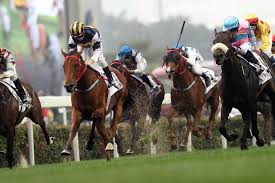For punters who make a rare foray into horse racing betting when the Grand National rolls around each April, it’s easy to overlook one key factor in your analysis: each runner’s handicap.
The weight assigned to each horse will have a major bearing on how they perform – remember, the Grand National course at Aintree is mega-long at four miles and two furlongs and features some of the most dastardly fences in the sport: names like Becher’s Brook and The Chair are synonymous with falls and riders being unseated.
The job of the horse racing handicapper is to create the perfect race: by adding extra weight to the saddles of the stronger runners and attaching only small impediments to the lower-rated horses, it should deliver the dream scenario of a perfectly competitive renewal that all have a chance of winning.
In reality, it doesn’t work out that way. Top weights don’t have a strong record in the Aintree showpiece, which explains why defending champion Noble Yeats has a tough task in 2023: despite being priced as the second-favourite at 8/1 in the Grand National odds, he will be some 14 lbs heavier in the weights this time compared to his triumph in 2022. It’s also why Cheltenham Festival winner Corach Rambler, who has been nicely treated by the handicapper at 10st 5lb, is the market protagonist at 6/1.
Your winners of the @RandoxHealth Grand National 2022
— Aintree Racecourse (@AintreeRaces) April 9, 2022
NOBLE YEATS 🙌 pic.twitter.com/3K1ccAaofK
A quick look back through the record books confirms that those that have been assigned a heavy weight in the past really don’t have a great record in the Grand National…
The Weighting Game
For the most part, the top-rated horses in the Grand National field will carry a handicap of around 12st – Noble Yeats, for example, will be asked to haul 11st 11lb around Aintree.
If we group together any horse weighted at 11st 10lb or heavier, we have to go way back to Red Rum’s Grand National victory in 1974 for the last time a top weight prevailed – and he was, according to most who saw him, a once-in-a-lifetime horse who would win one of the toughest races in the sport three times all told.
Keep scrolling backward in time and you’ll have to go back to 1950 for the previous winner at 11-10 or heavier, so already punters are blessed with the insight that Noble Yeats, and those around him in the handicaps, will have to re-write history if they are to reign supreme at Aintree.
Above and Beyond
There is more nuance to betting on the Grand National than simply blindly backing lighter-weighted horses – remember, these are rated lower by the handicapper and therefore may perform accordingly.
For context, the mean winning weight of the Grand National in the past decade has been around 11st 2lb, but the key to it all is finding those horses who can outrun their handicap based upon previous performances.
Corach Rambler, for example, won the Ultima Handicap Chase at the Cheltenham Festival from a weight of 11st 5lb – he’s a stone lighter for the Grand National, so you can see why he’s so fancied in the betting market. The question will be whether he can stay the four-mile plus distance.
💪 Delta Work wins back-to-back Glenfarclas Cross Country Chases!
— ITV Racing (@itvracing) March 15, 2023
Another gritty performance at @CheltenhamRaces #ITVRacing | #CheltenhamFestival pic.twitter.com/638o3C7eXr
Delta Work, the third-favourite for the 2023 Grand National, will carry 11st 4lb – a matter of weeks after winning the Cheltenham Festival’s Cross Country Chase at 11-07. The horse he beat by two lengths that day, Galvin, faces a 4lb rise at Aintree, which perhaps precludes him from selection by punters.
So as you sit down to pick out your Grand National bets, consider the handicaps – these weights might just help you to pick out the winner.
We offer free tips for horse racing daily on our free tips page so be sure to check it out.



